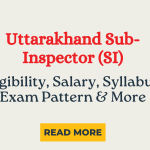The Union Public Service Commission publishes the UPSC Mains Syllabus 2024 through a website announcement. The UPSC mains exam 2024 comprises two qualifying papers, seven additional papers, four GS Papers, and two optional subject papers. The essay, general studies, and optional subject sections of the IAS Mains syllabus are covered. In this article, students will learn about the Mains Exam 2024.

One of the most important requirements for passing the IAS Mains exam is having a solid grasp of the UPSC Mains Syllabus. UPSC aspirants should be aware that they will only be eligible for the Mains Exam if they pass the preliminary exam. After understanding this, it will be easy for you to prepare for UPSC Civil Services IAS Exam.
UPSC Exam 2024 Highlights
Students can check the important details in the table given below:
| Particulars | Details |
|---|---|
| Name of Organization | UPSC |
| Official Website | https://upsc.gov.in/ |
| UPSC 2024 Notification Release Date | February 2, 2024 |
| Online Application Form Last Date | February 22, 2024 |
| Prelims Exam Admit Card | June 2024 |
| UPSC IAS 2024 Prelims Date | June 5, 2024 |
| Prelims Exam Result | June 22, 2024 |
| Admit Card for Mains Exam | August 30, 2024 |
| UPSC IAS Mains Exam Date | September 16-25, 2024 |
| UPSC IAS Final Result Announced | January 2025 |
| Exam mode | Offline – pen and paper mode |
UPSC Mains Exam Pattern 2024
The IAS Mains Assessment has two sections: qualifying and merit ranking. Papers A and B, which are the Language and English papers, will be accepted. Your grades for these papers won’t be factored into the calculations used to determine your ranking. Check the exam pattern to score the best marks in Mains Exam 2024.
| Paper | Subject | Duration | Total Marks |
|---|---|---|---|
| Paper A | Compulsory Indian language | 3 hours | 300 |
| Paper B | English | 3 hours | 300 |
| Paper I | Essay | 3 hours | 250 |
| Paper-II | General Studies I | 3 hours | 250 |
| Paper III | General Studies II | 3 hours | 250 |
| Paper IV | General Studies III | 3 hours | 250 |
| Paper V | General Studies IV | 3 hours | 250 |
| Paper VI | Optional I | 3 hours | 250 |
| Paper VII | Optional II | 3 hours | 250 |
Mains Exam 2024 Syllabus
The IAS Main Exam consists of four general studies papers, two required language papers, one essay paper, and two optional subject papers. It is an improved version of the IAS Prelims and a descriptive exam. The full Mains exam 2024 syllabus is available in given below.
English
- Comprehension of given passages
- Precis Writing
- Usage and Vocabulary
- Short Essays
Compulsory Indian Language
- Comprehension of given passages
- Precis Writing
- Usage and Vocabulary
- Short Essays
- Translation from English to the Indian Language and vice-versa.
The above UPSC Mains Papers are qualifying in nature, and the following are competitive in nature.
Essay
Candidates may be required to write essays on multiple topics. They will be expected to keep close to the essay’s subject, arrange their ideas in an orderly fashion, and write concisely. Effective and accurate expressions will receive credit.
General Studies-I: Indian Heritage and Culture, History, and Geography of the World and Society
- Indian culture will cover the salient aspects of Art Forms, literature, and Architecture from ancient to modern times.
- Modern Indian history from about the middle of the eighteenth century until the present- significant events, personalities, and issues.
- The Freedom Struggle — its various stages and important contributors/contributions from different parts of the country.
- Post-independence consolidation and reorganization within the country. History of the world will include events from the 18th century, such as the industrial revolution, world wars, redrawal of national boundaries, colonization, decolonization, political philosophies like communism, capitalism, socialism etc.— their forms and effect on society.
- Salient features of Indian Society, Diversity of India.
- Role of women and women’s organization, population and associated issues, poverty and developmental issues, urbanization, their problems and their remedies.
- Effects of globalization on Indian society.
- Social empowerment, communalism, regionalism & secularism.
- Salient features of the world’s physical geography.
- Distribution of key natural resources across the world (including South Asia and the Indian subcontinent); factors responsible for the location of primary, secondary, and tertiary sector industries in various parts of the world (including India).
- Important Geophysical phenomena such as earthquakes, tsunamis, Volcanic activity, cyclones, etc., geographical features and their location changes in critical geographical features (including water bodies and ice-caps) and in flora and fauna and the effects of such changes.
General Studies- II: Governance, Constitution, Polity, Social Justice and International relations
- Indian Constitution—historical underpinnings, evolution, features, amendments, significant provisions and basic structure.
- Functions and responsibilities of the Union and the States, issues and challenges pertaining to the federal structure, devolution of powers and finances up to local levels and challenges therein.
- Separation of powers between various organs dispute redressal mechanisms and institutions.
- Comparison of the Indian constitutional scheme with that of other countries.
- Parliament and State legislatures—structure, functioning, the conduct of business, powers & privileges, and issues arising from these.
- Structure, organization, and functioning of the Executive and the Judiciary—Ministries and Departments of the Government; pressure groups and formal/informal associations and their role in the Polity
- Salient features of the Representation of People’s Act.
- Appointment to various Constitutional posts, powers, functions and responsibilities of various Constitutional Bodies.
- Statutory, regulatory, and various quasi-judicial bodies.
- Government policies and interventions for development in various sectors and issues arising out of their design and implementation.
- Development processes and the development industry —the role of NGOs, SHGs, various groups and associations, donors, charities, institutional and other stakeholders.
- Welfare schemes for vulnerable sections of the population by the Centre and States and the performance of these schemes; mechanisms, laws, institutions and Bodies constituted for the protection and betterment of these vulnerable sections.
- Issues relating to development and management of Social Sector/Services relating to Health, Education, and Human Resources.
- Issues relating to poverty and hunger.
- Important aspects of governance, transparency and accountability, e-governance- applications, models, successes, limitations, and potential; citizens charters, transparency & accountability and institutional and other measures.
- Role of civil services in a democracy.
- India and its neighbourhood- relations
- Bilateral, regional and global groupings and agreements involving India and/or affecting India’s interests.
- Effect of policies and politics of developed and developing countries on India’s interests, Indian diaspora.
- Important International institutions, agencies and fora- their structure, mandate.
General Studies-III: Technology, Economic Development, Bio diversity, Environment, Security and Disaster Management
- Indian Economy and issues relating to planning, mobilization, of resources, growth, development and employment.
- Inclusive growth and issues arising from it.
- Government Budgeting.
- Major crops-cropping patterns in various parts of the country – different types of irrigation and irrigation systems storage, transport and marketing of agricultural produce and issues and related constraints; e-technology in aid of farmers.
- Issues related to direct and indirect farm subsidies and minimum support prices; Public Distribution System- objectives, functioning, limitations, revamping; issues of buffer stocks and food security; Technology missions; economics of animal-rearing.
- Food processing and related industries in India- scope’ and significance, location, upstream and downstream requirements, supply chain management
- Land reforms in India.
- Effects of liberalization on the economy, changes in industrial policy and their effects on industrial growth.
- Infrastructure: Energy, Ports, Roads, Airports, Railways etc.
- Investment models.
- Science and Technology- developments and their applications and effects in everyday life.
- Achievements of Indians in science & technology; indigenization of technology and developing new technology.
- Awareness in the fields of IT, Space, Computers, robotics, nano-technology, bio-technology and issues relating to intellectual property rights.
- Conservation, environmental pollution and degradation, environmental impact assessment.
- Disaster and disaster management.
- Linkages between development and spread of extremism.
- Role of external state and non-state actors in creating challenges to internal security.
- Challenges to internal security through communication networks, role of media and social networking sites in internal security challenges, basics of cyber security; money-laundering and its prevention.
- Security challenges and their management in border areas – linkages of organized crime with terrorism.
- Various Security forces and agencies and their mandate.
General Studies- IV: Ethics, Integrity and Aptitude
- This paper will include questions to test the candidate’s attitude and approach to issues relating to integrity, probity in public life and his problem-solving approach to various issues and conflicts faced by him in dealing with society. Questions may utilise the case study approach to determine these aspects. The following broad areas will be covered :
- Ethics and Human Interface: Essence, determinants and consequences of Ethics in human actions; dimensions of ethics; ethics – in private and public relationships. Human Values – lessons from the lives and teachings of great leaders, reformers and administrators; role of family society and educational institutions in inculcating values.
- Attitude: content, structure, function; its influence and relation with thought and behaviour; moral and political attitudes; social influence and persuasion.
- Aptitude and foundational values for Civil Service, integrity, impartiality and non-partisanship, objectivity, dedication to public service, empathy, tolerance and compassion towards the weaker sections.
- Emotional intelligence concepts and their utilities and application in administration and governance.
- Contributions of moral thinkers and philosophers from India and the world.
- Public/Civil service values and Ethics in Public administration: Status and problems; ethical concerns and dilemmas in government and private institutions; laws, rules, regulations and conscience as sources of ethical guidance; accountability and ethical governance; strengthening of ethical and moral values in governance; ethical issues in international relations and funding; corporate governance.
- Probity in Governance: Concept of public service; Philosophical basis of governance and probity; Information sharing and transparency in government, Right to Information, Codes of Ethics, Codes of Conduct, Citizen’s Charters, Work culture, Quality of service delivery, Utilization of public funds, challenges of corruption.
- Case Studies on the above issues.
Students can check the syllabus for the optional exam in the link given above. Moreover, students can prepare for the Civil Services IAS Exam after understanding the syllabus. This will help them to plan their studies for IAS preparation.
DHURINA wishes all the best for the upcoming exams !!!









